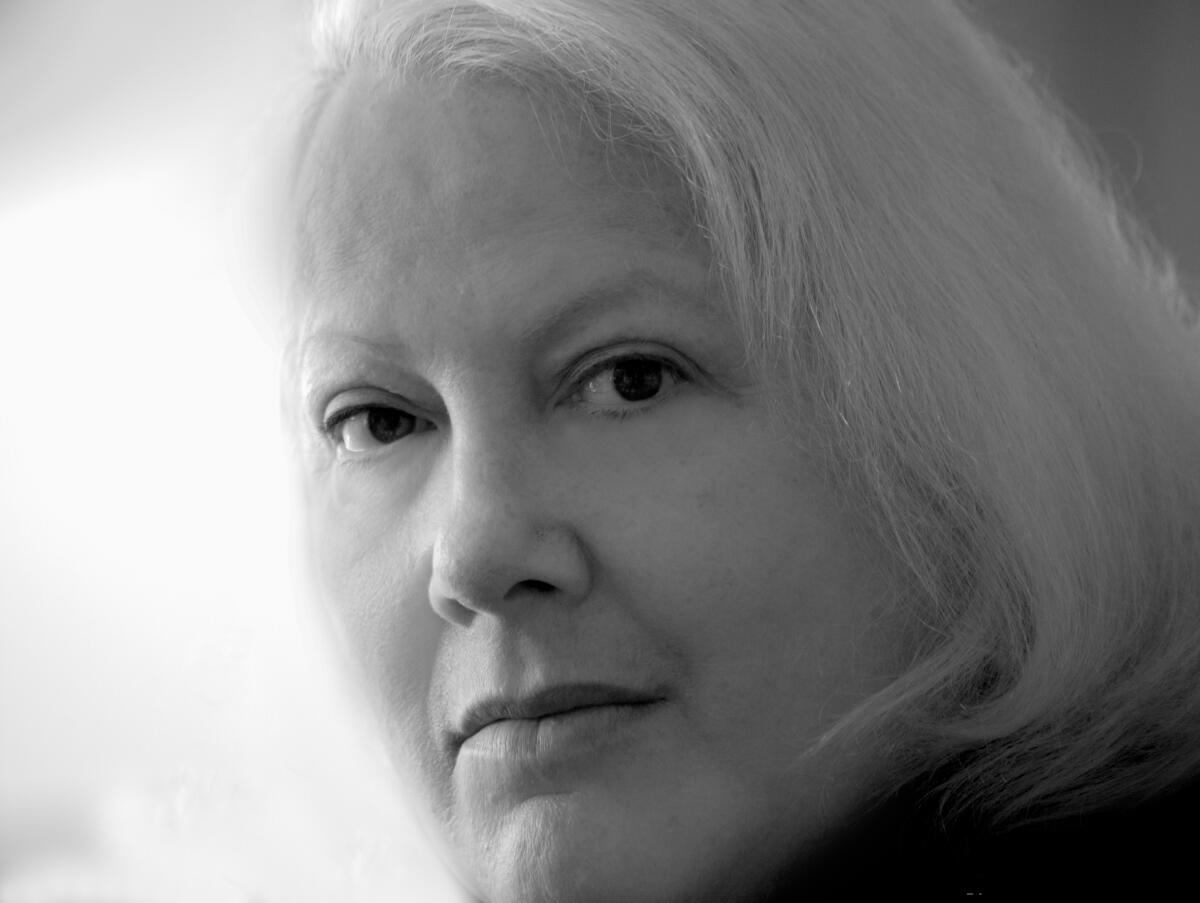Nikki Finke, Deadline founder and once the ‘most feared writer’ in Hollywood, dies at 68

- Share via
Veteran journalist Nikki Finke, who founded the entertainment trade site Deadline and who in her heyday was an elbows-out columnist serving up juicy industry scoops and skewering Hollywood’s elite, has died at age 68.
According to a family representative, Finke died Sunday morning in Boca Raton, Fla., after a prolonged illness.
Finke was revered and feared in the industry for exposing secrets, first through her LA Weekly column, Deadline Hollywood, which she eventually built into a website. She founded Deadline Hollywood Daily in 2006 on a Friday and quickly began building her audience with a snark-filled live-blog of the 78th Academy Awards the following Sunday. The site was largely a one-woman operation until 2009, when the Penske Media Corp. acquired it and hired Finke as editor in chief.
Her legacy is a form of entertainment news tailored for the internet versus the printed page, with an emphasis on being first, landing exclusives, relentlessly promoting the work and cutting through the noise of a crowded media landscape with a loud, opinionated and often mean voice — one that many equated to that of a bully. She was, a 2011 Times piece said, the “most feared writer” in Hollywood.
“I didn’t set out to be a disruptor,” Finke wrote in a 2016 column reflecting on Deadline’s 10th anniversary. “Or an internet journalist who created something out of nothing that put the Hollywood trades back on their heels, and today, under Penske Media ownership, is a website worth $100+ million. Or a woman with brass balls, f— you attitude and ruthless hustle, who told hard truths about the moguls and who accurately reported scoops first.
“I did recognize that showbiz coverage could change, because the digital platform leveled a playing field that had previously belonged to Variety and the Hollywood Reporter. Back then, the trades were slow to embrace the idea that trees no longer had to die for a media outlet to be influential.”
Deadline awards columnist and chief film critic Pete Hammond — who initially resisted leaving The Times before becoming one of Finke’s first hires — remembered the controversial writer fondly as a “visionary” who “pulled no punches.”
“I saw a different side of her, and she can be super charming,” Hammond said Sunday. “There was a lot of people that didn’t like her, because you’re never going to win a popularity contest when you’re telling truths about things. ... She kept her word. A lot of people don’t do that in this business.”
Hammond added that Finke was smart to understand the realities of the digital age.
“It changed the way Hollywood consumed their news,” he said. “It became a 24/7 thing. ... That’s the way the whole news business has really gone, and she was right there.” Hollywood is full PR machines that try to control the story, he added, “and she would have none of that.”
The Times reached out Sunday to more than a dozen industry insiders and peers of Finke, the vast majority of whom declined to comment or did not respond.
The Wrap founder Sharon Waxman — once a friend of Finke’s who wound up becoming her sworn enemy and fierce rival — deemed Finke “a tragic figure.”
“She was an extremely talented journalist who blazed a trail early in the internet of what digital media could look like,” Waxman said. Ultimately, however, “the scorched-earth tactics that she used led to her inability to be a long-term presence in this industry.”
Finke grew up in the Long Island village of Sands Point, N.Y., and graduated from Wellesley College in Massachusetts. She worked as a correspondent for the Associated Press, first in Moscow, then in London.
She later wrote for major publications including Newsweek, New York Magazine and the L.A. Times, where she was a staff writer in the late 1980s and early ’90s. Years later, she secured a freelancing contract with the New York Post to cover entertainment news.
While at the Post, Finke irked the Walt Disney Co. and its chief executive, Michael Eisner, with 2002 stories about Winnie the Pooh merchandising royalties. Disney felt her articles contained inaccuracies, and the company complained to her bosses that Finke was biased against Disney. The Post fired Finke over the Winnie the Pooh articles, and Finke eventually sued Disney for attempting to interfere with her contract.
Finke went on to write her Deadline Hollywood column for LA Weekly and had just moved it online when the 2007 Hollywood writers strike erupted. Agents, executives and assistants were desperate for insider news — and Finke did not disappoint.
Her in-your-face style of reporting attracted legions of fans at a time when trade publications’ coverage of Hollywood was sympathetic to the studios. The trades, which relied on advertising revenue from the studios and TV networks, appeared hesitant to pick fights with the people who paid the bills.
Finke was different. She relished calling out industry figures for alleged misdeeds and hypocrisy. Assistants and lower-level executives began sending her tips. Leading industry figures and publicists quickly realized they needed to get on Finke’s good side so they could avoid her wrath online. Her strategy was effective: Top industry agents, executives and their publicists were among her key sources for leaks about executive firings, show casting news and inside drama that previously went unreported.
Even as competitors pointed out Finke’s errors and critics began making her the subject of internet rumor and speculation, Finke doubled down, declaring “TOLDJA!” when her scoops proved true.
She protected her sources, while heaping vitriol on those she disliked. “I never set out to be mean,” she wrote in Deadline on its 10th anniversary. “It just flowed through my typing fingers.”
Auto racing scion Jay Penske bought Deadline in 2009, his initial bid to become a Hollywood publishing titan. A few years later, after much friction with Penske, Finke parted from the site that she founded. In announcing the cutting of ties, Deadline editors said in a note to readers: “Businesses evolve and change, and we’ve learned that no one is indispensable.”
After she left, Finke lashed out at Penske on Twitter and other forums. She tried to start another online column, but her deal with Penske had a noncompete clause that prevented her from writing Hollywood news.
Finke’s influence in Hollywood waned, but her influence can be felt to varying degrees in the media outlets that followed, including the Wrap and more recent upstarts such as the Ankler and Puck.
She is survived by her sister, Terry Finke Dreyfus, and brother-in-law, James, plus nieces Sarah Greenhill and Diana Leighton.
More to Read
The biggest entertainment stories
Get our big stories about Hollywood, film, television, music, arts, culture and more right in your inbox as soon as they publish.
You may occasionally receive promotional content from the Los Angeles Times.












